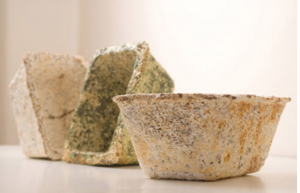
Re-envisioning Materials Use ~
The EPA says manufacturing an item with PET plastic is effectively creating 100 times the amount of toxins as the same item made of glass (Rogers, 2005). Humans were able to design goods without plastics for thousands of years, with our ingenuity it should not be ‘the end of the world’ to ditch a highly pollutive substance we have grown so fond of. Opting for quality over quantity, people can choose more durable goods that do not break so easily and are designed to last a lifetime, and have the ability to be repaired. The Plastic Disclosure Project (2016) suggests materials solutions that fall under the lines of cradle-to-cradle thinking: better design, better materials, more recycling, and better yet, repurposing and reusing what you already have.
Plastic is not the only material we can use for packaging and manufacturing; in fact, limiting our options to only a highly-pollutive material, merely shows a lack of imagination and further benefits vested interests. (when considering the ‘single option bias,’ if all the options were environmentally positive than it wouldn’t matter which one was chosen). One creative option is mushrooms, which provide many innovative solutions to reduce waste. Not only are they nature’s great decomposition machines, mushrooms can also be crafted into materials, such as packaging that can be made from agricultural waste and can decompose easily once put back into the environment (Bayer, 2010; Ecovative Design, 2017). We can even help our bodies decompose faster with a mushroom burial suit (Lee2011). Mushrooms have also shown to be effective for petroleum spill clean-up and other forms of bioremediation (Adenipekun et al., 2012; Chiu et al., 2009; Russell et al., 2011; Stamets, 2008) – however, it is better to keep all the harmful substances out of the environment to begin with to save timely, costly and impactful ecosystems damage.
